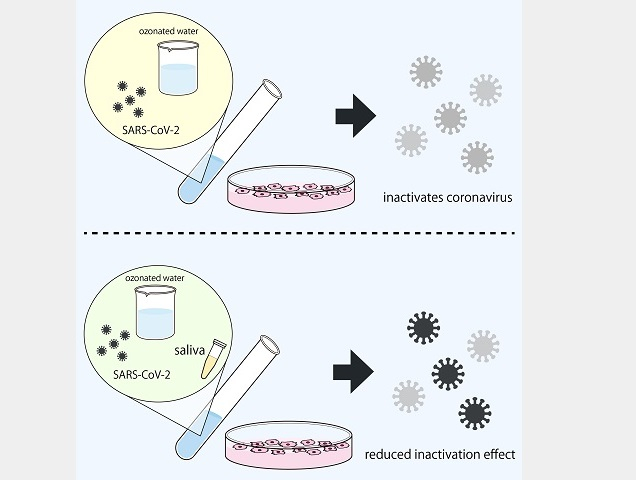Research News
Feb 3, 2025
- Veterinary Science
Observing ozonated water’s effectiveness against SARS-CoV-2 in saliva
Amylase and mucin decrease the effects of ozonated water
Salivary proteins reduced disinfection effect of ozonated water
Salivary organic matter has been shown to reduce ozonated water’s effect in inactivating the virus responsible for COVID-19.
Credit: Osaka Metropolitan University

Disinfecting surfaces is crucial in keeping bacteria and viruses at bay, but the cleaning solutions could be ineffective if met with neutralizing compounds.
Ozonated water has a strong disinfection effect on mold and bacteria, and is also shown to work on SARS-CoV-2, which is responsible for COVID-19. The downside is that ozonated water breaks down quickly in the presence of organic matter, which reduces its effectiveness. SARS-CoV-2 is transmitted through droplets mixed with bodily fluids, such as saliva and nasal mucus which contain organic matters. For this reason, it is necessary to investigate how effective ozonated water is in the presence of organic matter.
In collaboration with Panasonic Corporation, Associate Professor Mayo Yasugi of the Graduate School of Veterinary Science at Osaka Metropolitan University led a research group that examined the human salivary organic components, amylase, mucin, and urea, and ozonated water’s effect on SARS-CoV-2 in the presence of these components.
The results revealed that amylase and mucin decomposed ozone as these protein concentrations increased, but urea did not. In addition, the amount of inactivated SARS-CoV-2 decreased as the concentrations of amylase and mucin increased, attenuating the ozonated water’s ability to disinfect.
“This report is the first in the world to evaluate the extent in which organic matter in saliva weakens the disinfection effect of ozonated water on SARS-CoV-2, and it is expected to provide the basis for applying ozonated water in real-world settings,” stated Professor Yasugi.
The findings were published in the Journal of Hospital Infection.
Funding
This study was financially supported by Panasonic Corporation Living Appliances and Solutions Company.
Paper information
Journal: Journal of Hospital Infection
Title: Disinfection effect of ozonated water on SARS-CoV-2 in the presence of salivary proteins
DOI: 10.1016/j.jhin.2024.11.005
Authors: Mayo Yasugi, Kiyoe Gunji, Ken-ichiro Inagaki, Mami Kuroda, Chihiro Ii
Published: 14 November 2024
URL: https://doi.org/10.1016/j.jhin.2024.11.005
Contact
Mayo Yasugi
Graduate School of Veterinary Science
Email: shishimaru[at]omu.ac.jp
*Please change [at] to @.
SDGs

